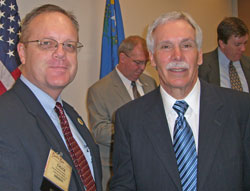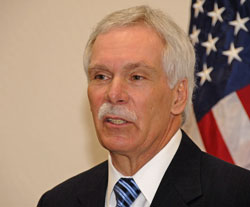The National 25x’25 Steering Committee has responded to widespread media coverage of studies published by Science Magazine last week, saying they failed to report that there are ways to insure that future biofuels give us both a new renewable energy source and greatly reduced greenhouse gas emissions.
The journal Science reported last week that studies indicate clearing land for the production of biofuels would produce twice as much greenhouse gas as the use of biofuels would reduce.
 The statement from the 25x’25 Alliance says, “environmentally sensitive lands should not be exploited in pursuit of renewable fuels. In fact, we have long held that the growing increase in demand for energy, along with food, feed and fiber, can be met with a boost in production facilitated by advances in technology.”
The statement from the 25x’25 Alliance says, “environmentally sensitive lands should not be exploited in pursuit of renewable fuels. In fact, we have long held that the growing increase in demand for energy, along with food, feed and fiber, can be met with a boost in production facilitated by advances in technology.”
The group also says that development of cellulosic ethanol will not only minimize land use changes but help the environment. They note a recent study of the use of switchgrass for ethanol by the University of Nebraska-Lincoln showed that it produced 540% more energy than it took to grow it. Switchgrass offers many environmental benefits such as preventing runoff, putting organic material back into the ground improving soil and requires no pesticides or fertilizer.




 This is the third ethanol plant investment for The Andersons, according to CEO Mike Anderson. “Locating in Darke County, the largest corn-producing county in the state, is ideal and the community’s reception has been exceptional. In addition to providing a viable alternative fuel source for our country, we look forward to serving the local farming community through corn sourcing and high-quality distillers dried grains.”
This is the third ethanol plant investment for The Andersons, according to CEO Mike Anderson. “Locating in Darke County, the largest corn-producing county in the state, is ideal and the community’s reception has been exceptional. In addition to providing a viable alternative fuel source for our country, we look forward to serving the local farming community through corn sourcing and high-quality distillers dried grains.”
 According to the report, “increasing public concerns about climate change — and its potential economic and political security consequences — are driving public policy and private investment to bring clean energy technologies from the fringes of the global energy industry to the center of activities as quickly as possible.”
According to the report, “increasing public concerns about climate change — and its potential economic and political security consequences — are driving public policy and private investment to bring clean energy technologies from the fringes of the global energy industry to the center of activities as quickly as possible.” The man behind the movie
The man behind the movie 

 LifeLine Foods is a unique company that uses corn to produce food and fuel. One portion of the kernel is processed and marketed to the food industry while the remainder of the corn kernel is used for, among other things, cattle feed and energy needs. Utilizing a bran energy recovery system, total plant energy needs will be reduced by approximately 50 percent. This method insures that the company is getting the most value out of corn, benefiting the agriculture, food and ethanol industries.
LifeLine Foods is a unique company that uses corn to produce food and fuel. One portion of the kernel is processed and marketed to the food industry while the remainder of the corn kernel is used for, among other things, cattle feed and energy needs. Utilizing a bran energy recovery system, total plant energy needs will be reduced by approximately 50 percent. This method insures that the company is getting the most value out of corn, benefiting the agriculture, food and ethanol industries. LifeLine was contracted by the
LifeLine was contracted by the  The 2008 NEVC Executive Officers include: Chairman Bernie Punt,
The 2008 NEVC Executive Officers include: Chairman Bernie Punt,  Our Secretary of Agriculture, Ed Schafer, made his first major public policy speech today at the Cattle Industry Convention in Reno, NV. I had the pleasure of meeting him and talked someone into snapping a photo too. I thought you might be interested in hearing an audio clip from his speech here this morning since he hit the subject of high feed prices and renewable energy head on.
Our Secretary of Agriculture, Ed Schafer, made his first major public policy speech today at the Cattle Industry Convention in Reno, NV. I had the pleasure of meeting him and talked someone into snapping a photo too. I thought you might be interested in hearing an audio clip from his speech here this morning since he hit the subject of high feed prices and renewable energy head on. He says there’s no way we can get away from the reality of the need to become more energy independent here in America.
He says there’s no way we can get away from the reality of the need to become more energy independent here in America.